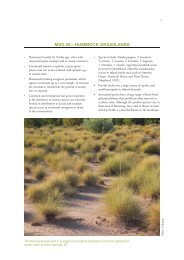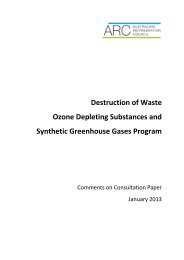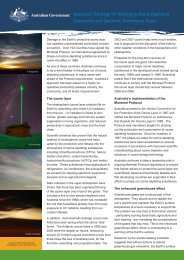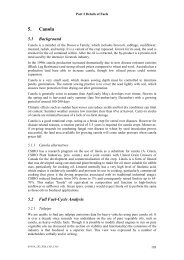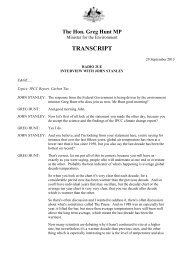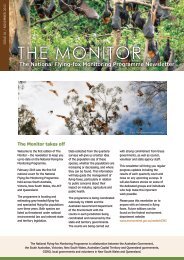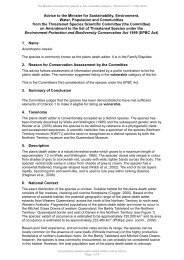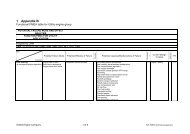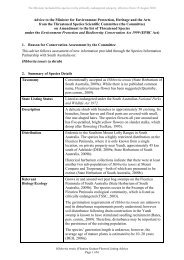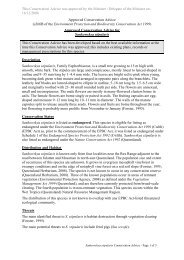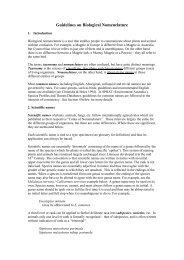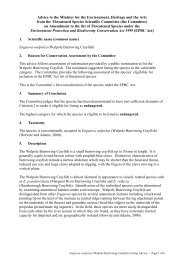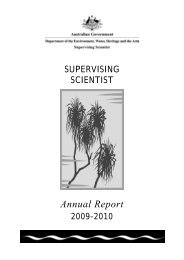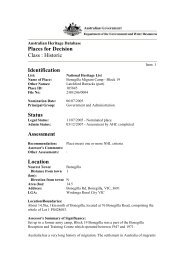WEST KIMBERLEY PLACE REPORT - Department of Sustainability ...
WEST KIMBERLEY PLACE REPORT - Department of Sustainability ...
WEST KIMBERLEY PLACE REPORT - Department of Sustainability ...
Create successful ePaper yourself
Turn your PDF publications into a flip-book with our unique Google optimized e-Paper software.
law. An imperative to 'avoid another Noonkanbah' stimulated Commonwealth<br />
discussions with peak mining and resource bodies such as the Australian Mining<br />
Industry Council (AMIC) and the Australian Petroleum Producers and Explorers<br />
Association (APPEA). All agreed that 'the interests <strong>of</strong> all parties will best be served,<br />
not by confrontation, but by pursuing a policy <strong>of</strong> negotiation and consultation' (Berndt<br />
1982, 146–147).<br />
Kimberley Aboriginal people also took a proactive stance in developing their own<br />
strategies and protocols to counter the absence <strong>of</strong> supportive heritage and land rights<br />
legislation. Aboriginal community-based organisations such as the Kimberley Land<br />
Council were at the forefront in negotiating innovative heritage protection and<br />
clearance methodologies oriented towards recognising and balancing the rights and<br />
interests <strong>of</strong> both Aboriginal Traditional Owners and exploration and resource<br />
extraction parties (Doohan 2008).<br />
Noonkanbah continues to have powerful meaning for Aboriginal people across the<br />
Kimberley, many <strong>of</strong> whom view the dispute at Noonkanbah as the genesis <strong>of</strong> the pan-<br />
Kimberley political movement which ultimately spawned Aboriginal organisations<br />
that have become central to the articulation <strong>of</strong> the cultural, political and social<br />
aspirations <strong>of</strong> Kimberley people. The establishment <strong>of</strong> the Kimberley Land Council in<br />
May 1978 led directly to the formation <strong>of</strong> the Kimberley Language Resource Centre<br />
(1984), the Kimberley Aboriginal Law and Culture Centre (1984), and Magabala<br />
Books (1987).<br />
Allbrook (2009) invites comparisons <strong>of</strong> Noonkanbah with the Eureka Stockade <strong>of</strong><br />
1854, that other infamous episode in Australian history in which a section <strong>of</strong> society<br />
stood up to what was widely perceived to be the unjust use <strong>of</strong> power by an Australian<br />
Government. Like Eureka, the protesters at Noonkanbah gained widespread public<br />
support for their stand. Like Eureka, the protest at Noonkanbah was put down by<br />
force and, like Eureka, although the State won the battle at Noonkanbah, the episode<br />
was significant in ushering in changes to the law and the way resource extraction<br />
business was henceforth to be carried out.<br />
Allbrook (2009) notes that Ritter (2002) and others claim that Noonkanbah was a 'key<br />
event' in a 'crisis <strong>of</strong> legitimacy that engulfed the Australian political system in relation<br />
to Aboriginal affairs between Milirrpum and Mabo', and 'one <strong>of</strong> the key stimuli for<br />
[Aboriginal people] turning to the common law' (Palmer 1983; Keon-Cohen 2000).<br />
The inception <strong>of</strong> the Mabo native title case in 1982 eventually brought a fundamental<br />
shift in the rights <strong>of</strong> Aboriginal people to be involved in decisions over the use <strong>of</strong><br />
traditional lands. This was recognised by the High Court in its decision on the case in<br />
1992, and in the Commonwealth Government’s statutory response to that decision. The<br />
Native Title Act 1993 (Cth) provided an avenue for Aboriginal Traditional Owners to<br />
claim the legal right to object, and limited rights to negotiate. The Native Title Act 1993<br />
(Cth) also provided an avenue for Aboriginal Traditional Owners to claim the legal<br />
right to object and negotiate over applications to use traditional lands.<br />
Noonkanbah is one in a series <strong>of</strong> important steps in the national struggle <strong>of</strong><br />
Aboriginal people to have their rights to practice traditional law and culture,<br />
and have their rights to traditional land ownership recognised. In addition,<br />
Noonkanbah brought about significant change to resource company policies and<br />
132



